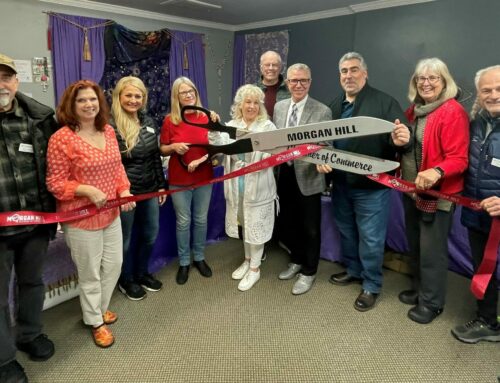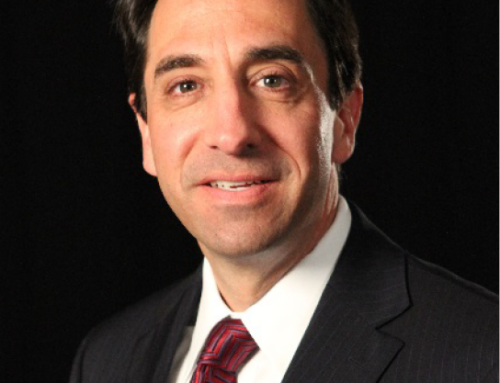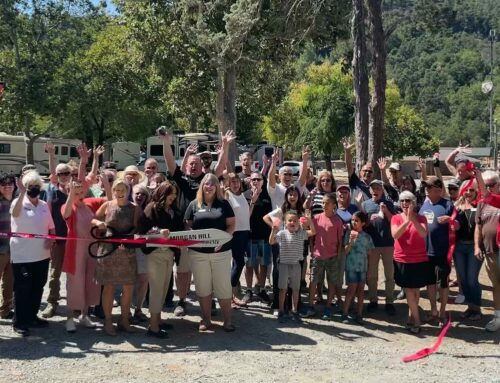Bowling tournament raised funds for Operation Freedom Paws
Published in the November 7 – 20, 2018 issue of Morgan Hill Life
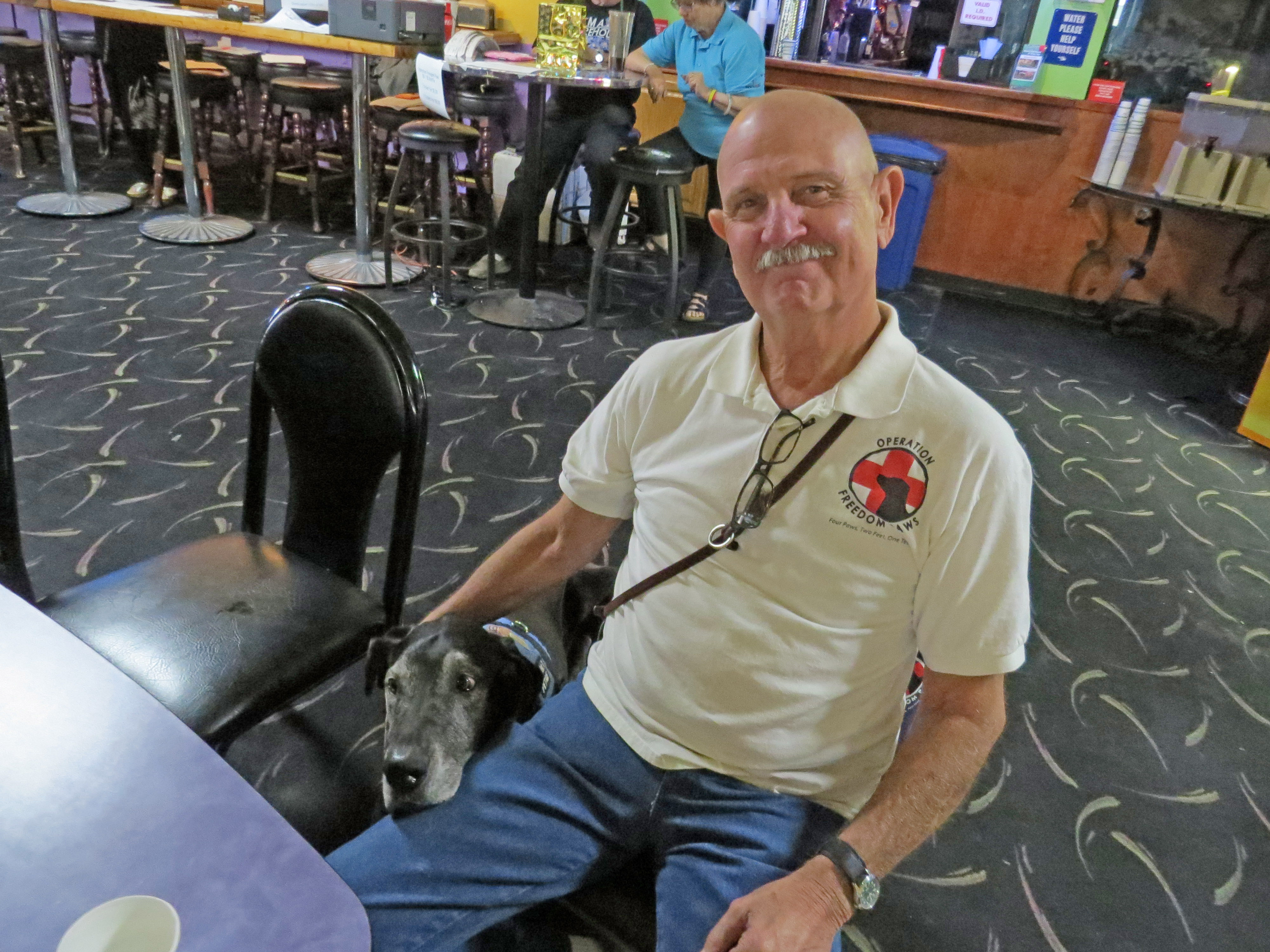
Photo by Marty Cheek
Denny McLaughlin, a veteran who serves on the OFP board of directors, with his service dog Abbey.
It’s been said that a dog is man’s best friend. For veterans and individuals with disabilities, that friend can also be a lifesaver. On October 27, bowlers of all abilities helped support Operation Freedom Paws by participating in their inaugural bowling tournament at Morgan Hill Bowl.
“There are two pieces to this event,” said Mary Cortani, president and executive director of Operation Freedom Paws (OFP), and a longtime bowler. “The California Bowling Writers Association was in the process of picking a new charity to support. They wanted to be a sponsor and kick off our inaugural tournament. We’re hoping this is the beginning of many more to come.”
Open to everyone, even those prone to throwing gutter balls rather than picking up a 7-10 split participated.
“Even bowlers who held USBC-certification (U.S. Bowling Congress), this was a ‘serious’ tournament with prizes. For others, they just came out and bowled for fun and support us,” Cortani said.
“There was a drawing for prizes for both categories,” Megan Wenholz, OFP’s marketing director, said. “Some of the prizes included a wine-tasting basket from local wineries and a sports fan basket.”
Cortani’s story is a familiar one to many. She received the CNN Heroes Award for her work matching veterans with service dogs after a former Marine approached her. He was in search of a canine companion to alleviate anxiety and provide assistance, and he was frustrated by the lengthy waiting lists at other organizations. It was clear he needed help sooner rather than later. So Cortani, a Vietnam-era veteran and Certified Army Master of Canine Education, accepted the challenge.

Photo by Marty Cheek
Mary Cortani shows off her form at the inaugural Operation Freedom Paws bowling fundraiser.
In her own transition after leaving the military, she was “lost” for a short period of time. “I was reinventing myself but struggling,” she admitted. Eventually, she decided to go back to what she loved, and opened a dog training business. That gave her a sense of purpose, and she wanted that for other veterans as well.
“When someone has suicidal tendencies, you can tell when you talk to them,” Cortani said. “I hadn’t trained service dogs, but had trained working dogs, such as police dogs who sniff for narcotics, and do search and rescue. Knowing the capability of the dog’s nose and being familiar with the guide and mobility assistance dogs, I made him a promise that we’d give it a shot and go on this journey together.”
What started with one Marine in 2010, led to three in 30 days, and has become 347 people as of mid-September 2018. Today, OFP’s service dogs provide a variety of critical functions for veterans and individuals with disabilities. These include helping clients stay calm and focused, blocking or creating protective space around a client, alerting a client to events or dangers, retrieving objects, and more.
 The training the client receives is funded in large part by donations, so events like the bowling tournament help ensure that OFP can continue to provide these valuable services. OFP also relies on partnerships with local businesses such as Old City Hall Restaurant and Family Pet Care. Many of OFP’s clients are on a fixed income. Therefore, OFP provides gas cards so clients can attend training, and gift cards to Old City Hall so they can come and have lunch or breakfast with the OFP team.
The training the client receives is funded in large part by donations, so events like the bowling tournament help ensure that OFP can continue to provide these valuable services. OFP also relies on partnerships with local businesses such as Old City Hall Restaurant and Family Pet Care. Many of OFP’s clients are on a fixed income. Therefore, OFP provides gas cards so clients can attend training, and gift cards to Old City Hall so they can come and have lunch or breakfast with the OFP team.
“It costs us $15,000 per dog team, but there is no cost to the veteran,” Cortani said. “And we do more than provide the dog. (Clients) have to go to the restaurant with us. We also have a family dog camp each October, with fun activities in the Groveland community of Tuolomne Trails.” Additionally, they go on excursions to places like San Jose Giants games and Gilroy Gardens. The intent is to show clients they can do everyday things without being isolated.
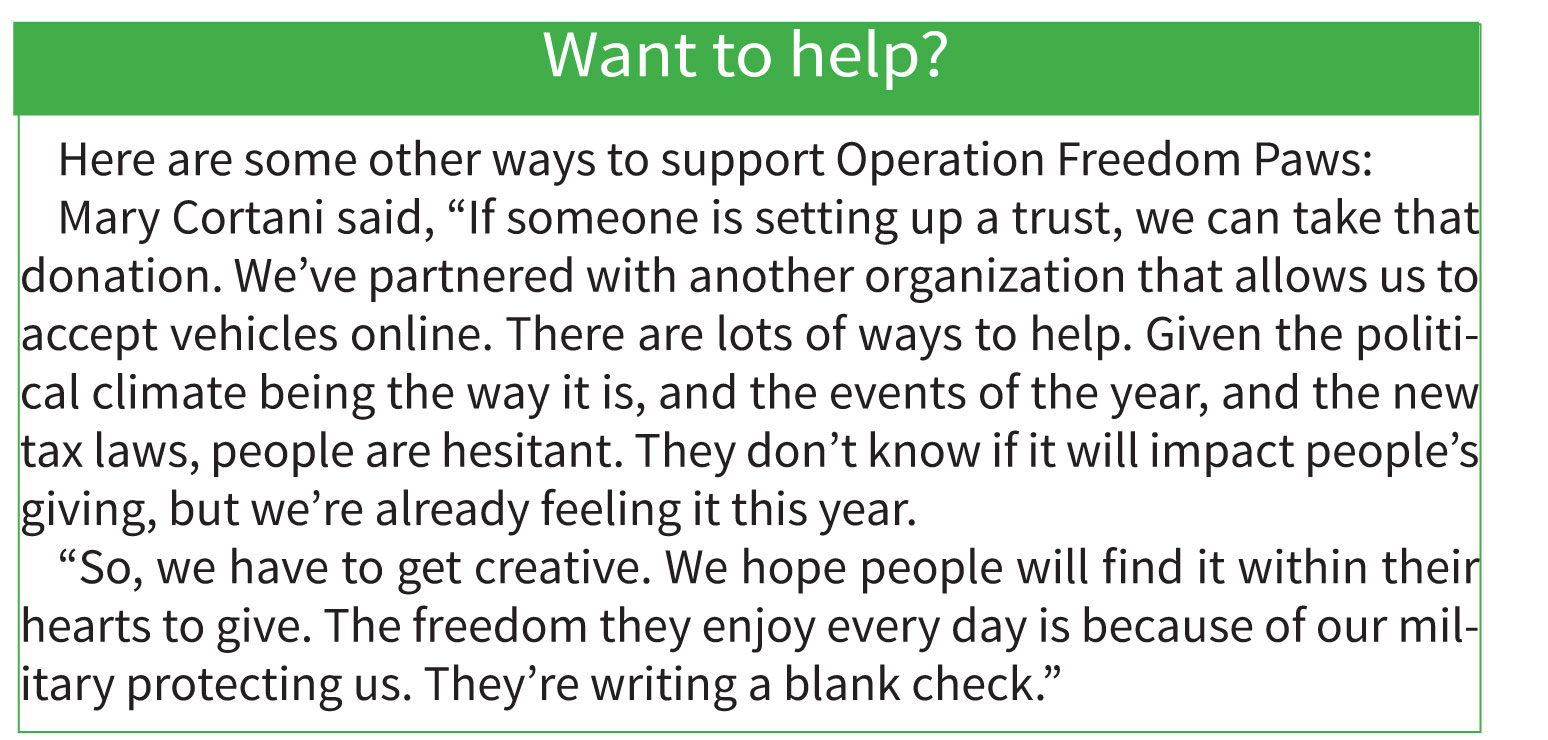 Isolation is a dangerous condition, especially for veterans who may be dealing with Post Traumatic Stress Disorder (PTSD), Complex-Post Traumatic Stress (CPTS), and Traumatic Brain Injury (TBI) symptoms. It’s estimated that 22 veterans commit suicide every day.
Isolation is a dangerous condition, especially for veterans who may be dealing with Post Traumatic Stress Disorder (PTSD), Complex-Post Traumatic Stress (CPTS), and Traumatic Brain Injury (TBI) symptoms. It’s estimated that 22 veterans commit suicide every day.
“I don’t think that’s accurate,” said Cortani. “I actually think it’s a little higher. Transition for anyone is tough. People don’t embrace change. We all struggle, especially when the change is not of our choice.”
Cortani further explained, “We see there is a lag, with different dynamics taking place. With Afghanistan and Iraq vets, there’s usually a six- to seven-year lag to reach out for help. They’re taught to give help, but not to ask for help. It’s sad that they get to this point. Then there’s the whole navigation through the VA system, which can add a couple years to that. Then we have Vietnam vets, Bosnia, and everything in between. For them, there was no recognition. They weren’t in the news all the time. Vietnam vets just ‘stuffed it,’ and many are just now grappling and coming to terms.”
To support those in need, OFP is always available. “We have staff here 24 hours a day,” Cortani said. “When we have clients struggling, this is their safe place. They can come at 1 a.m. and have someone to talk to. We get a call and we deal with the crisis.”
She added that training can be harder for clients with specific needs, and the OFP team recognizes that their clients all have more than one thing going on in their lives.
“It’s about creating habits,” Cortani said. “There’s a therapist at every session. We’re always available if someone is struggling. We make them feel safe and build trust. They can always come here. PTSD doesn’t just affect veterans. Trauma is trauma. It also affects families.”
OFP offers many services to the public as well, such as day care, boarding, and dog training. That helps fill the coffers so that they can achieve their goal: to train the individual to train their own dog, and then certify them together as a service dog team. Most of the dogs come from rescue shelters. Each is then matched to a specific client’s physical and psychological needs, with a commitment to complete OFP’s 48-week training program. This enables clients to feel safe and secure, manage their day-to-day lives, and begin to view their future with renewed hope.
A few hours at a bowling alley seems like an easy exchange to support such a worthy cause.


